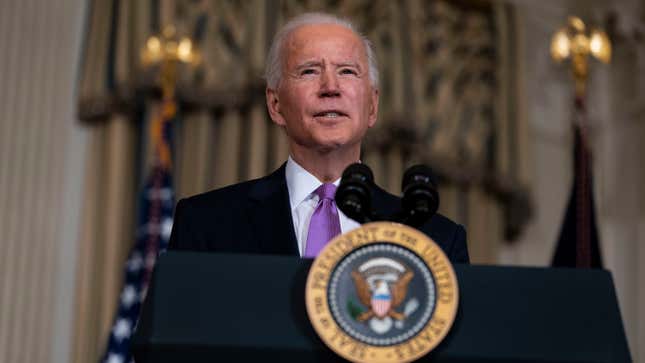You (Almost) Did It, Joe
Politics

In the White House State Dining Room Tuesday, President Biden signed four executive orders aimed toward tackling systematic racism in the United States. But first, he delivered a speech emphasizing the importance of restoring the so-called “soul of the nation.”
“We need criminal justice reform, but that isn’t nearly enough,” Biden said. “We need to open the promise of America to every American. And that means we need to make the issue of racial equity not just an issue of one department of government, it has to be the business of the whole of government.”
Biden invoked George Floyd—the Black man whose death at the hands of a white Minneapolis police officer spurred a summer of mass protest—and called his killing a “knee on the neck of justice” that altered hearts and minds before signing the following orders: directing the Department of Housing and Urban Development to rectify racially discriminatory federal housing policies that were weakened under President Trump, strengthening the federal government’s “commitment to tribal sovereignty and consultation,” combatting racism and xenophobia against Asian Americans and Pacific Islanders, and directing the Department of Justice to end its relationship with private prisons.
It was the decision to cut the DOJ’s use of private prisons that garnered the most headlines, as it should: Aside from concerns that private prisons cut corners that can impact the safety and wellbeing of incarcerated people, they ultimately profit from and encourage mass incarceration, a racist and classist system that has upended the lives of countless Black and brown men and women. Most of America’s incarcerated people are held in public facilities, and several private facilities have decades-long contracts with the government that may be difficult to break before their end date, but weaning the federal government of its dependency on private prisons is one step toward a less arcane mode of carceral punishment.
While this is exciting news that certainly gives Biden hope from more left-leaning Democratic voters, there’s a significant downside: That executive order doesn’t include doesn’t apply to Department of Homeland Security affiliated facilities. In other words, those locked up in ICE facilities are still fucked.
This wasn’t the only Democratic policy item Tuesday that felt more like a bunt than a home run hitter. The Democratic-majority House and Senate introduced legislation that would raise the federal minimum wage from $7.25 to $15…by 2025.
The work of local Fight for 15 activists over the years has clearly made an impact on lawmakers, and that cannot be ignored or brushed aside. By the 2022 midterm elections, the federal minimum wage will have already jumped to $11, which could be a major plus for Democrats maintaining some political power.
But the modern Fight for $15 movement started in 2012, nearly a decade ago. If a $15 minimum wage was a reasonable ask nearly a decade ago, what should a realistic federal minimum wage really look like in 2025? Probably not $15.
Of course, there are logistics to any policy and as easy as it is to sneer that no one should be in business if they can’t pay their workers at least $15 an hour, the growing pains that will surely result from these necessary wage shifts are unlikely to be ignored by politicians who depend on business owners’s support. But it’s tough to reckon with the fact that a boon for the working class is still not enough for many who can hardly afford the cost of living, even with such an increase.
Don’t get it twisted: Both the executive orders and the minimum wage legislation are positive updates from a party that has been criticized as meek even with the legislative power they’ve long craved. However, sparkling headlines don’t tell the full story. Those on the left should take this news as a step in the right direction, but it’s not time to leap for joy just yet.